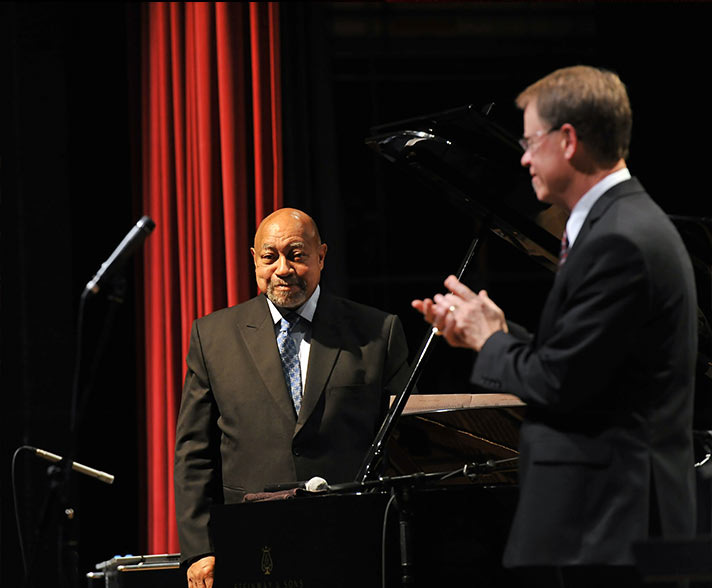Kenny Barron
Pianist Kenny Barron's unmatched ability to mesmerize audiences with his elegant playing, sensitive melodies and infectious rhythms is what inspired The Los Angles Times to name him "one of the top jazz pianists in the world" and Jazz Weekly to call him "The most lyrical piano player of our time."
Philadelphia is the birthplace of many great musicians, including one of the undisputed masters of the jazz piano: Kenny Barron. Barron was born in 1943, and while he was a teenager he started playing professionally with Mel Melvin's orchestra. This local band also featured Barron's late brother, Bill, the tenor saxophonist.
By 1959, Barron had worked with drummer Philly Joe Jones while still in high school. At age 19, he moved to New York City and freelanced with Roy Haynes, Lee Morgan and James Moody after the tenor saxophonist heard him play at the Five Spot. Upon Moody's recommendation, Dizzy Gillespie hired Barron in 1962 without hearing him play a note. It was in Dizzy's band that Barron developed an appreciation for Latin and Caribbean rhythms. After five years with Dizzy, he played with Freddie Hubbard, Stanley Turrentine, Milt Jackson, and Buddy Rich. The early '70s found Barron working with Yusef Lateef, whom Barron credits as a key influence in improvisation. Encouraged by Lateef to pursue a college education, Barron balanced touring with studies and earned his B.A. in music from Empire State College, By 1973, he had joined the faculty at Rutgers University as a professor of music. He held this tenure until 2000, mentoring many of today's young talents including David Sanchez, Terence Blanchard and Regina Bell. In 1974, Barron recorded his first album as a leader, Sunset To Dawn, for the Muse label. He has since recorded more than 40 albums in this capacity.
Following stints with Ron Carter in the late '70s, Barron formed a trio with Buster Williams and Ben Riley; the group also worked alongside Eddie "Lockjaw" Davis, Eddie Harris, Sonny Stitt and Harry "Sweets" Edison. Throughout the '80s, Barron collaborated with the great tenor saxophonist Stan Getz, touring with Getz's quartet and recording several legendary albums including Anniversary, Serenity and the Grammy-nominated People Time. During this same period, he co-founded the quartet Sphere, along with Buster Williams, Ben Riley and Charlie Rouse. This band focused on the music of Thelonious Monk and original compositions inspired by him. Sphere recorded several outstanding projects for the Polygram label, including Four For All and Bird Songs. After the death of Charlie Rouse, the band took a 15-year hiatus and reunited, replacing Rouse with alto saxophonist Gary Bartz. This reunion made its debut recording for Verve Records in 1998.
Barron's own recordings for Verve have earned him nine Grammy nominations, beginning in 1992 with People Time, an outstanding duet with Stan Getz, followed by the Brazilian-influenced Sambao, and, most recently for Freefall, in 2002. He received other Grammy nominations for Spirit Song, Night and the City (a duet with Charlie Haden), and Wanton Spirit, a trio recording with Roy Haynes and Haden. It is important to note that these three recordings each received double-Grammy nominations (for album and solo performance.) His CD Canta Brasil (Universal France) linked Barron with Trio de Paz in a fest of original Brazilian jazz; it was named a Critics Choice Top Ten CD of 2003 by Jazziz Magazine. Barron's 2004 release, Images (Universal France), was inspired by a suite originally commissioned by The Wharton Center at Michigan State University and features multi-Grammy nominated vibraphonist Stefon Harris. The long-awaited trio sequel featuring Ray Drummond and Ben Riley, The Perfect Set, Live At Bradley's, Part Two (Universal France/Sunnyside), was released in October 2005.
Barron consistently wins jazz critics' and readers' polls, including polls from Downbeat, Jazz Times and Jazziz magazines. In 2005 he was inducted into the American Jazz Hall of Fame and won a MAC Lifetime Achievement Award. He is a six-time recipient of Best Pianist from the Jazz Journalists Association and was as a finalist in the prestigious 2001 JazzPar International Jazz Award.
